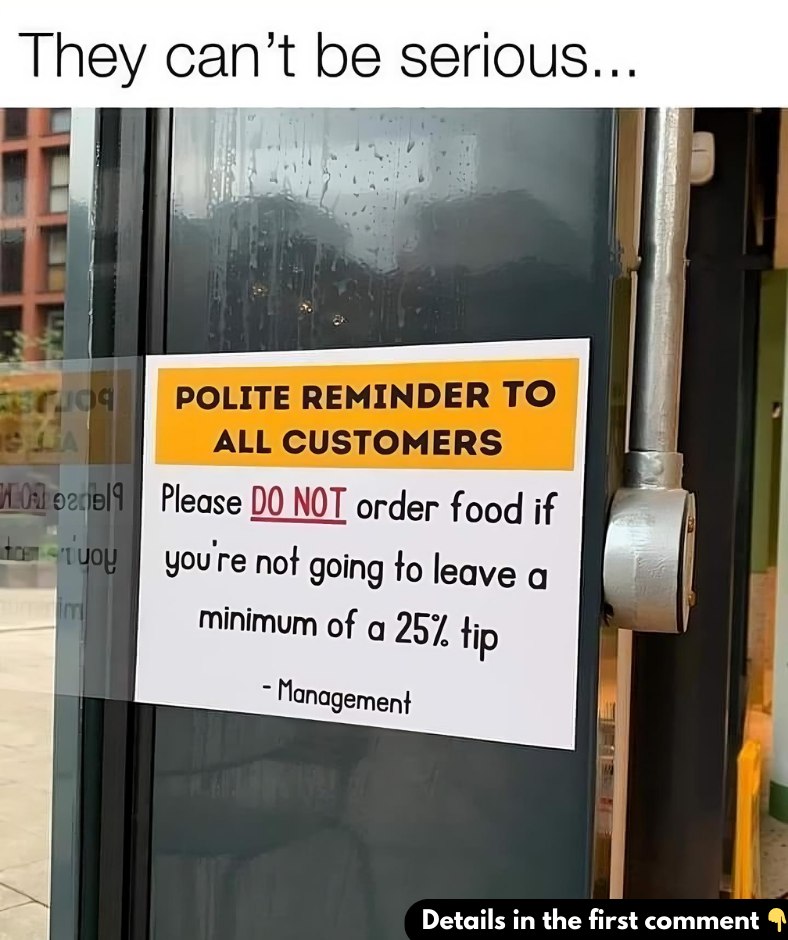Tipping culture has been a long-standing tradition in countries like the United States, where it’s seen as a way to reward good service. But what was once a gesture of appreciation has morphed into a divisive topic, leaving many to question its fairness and relevance in today’s world. What began as a simple thank-you for exceptional service now feels like an obligation, sparking heated discussions about whether tipping needs a complete overhaul.

The Origins of Tipping
The practice of tipping dates back to 19th-century Europe and was later adopted in the U.S. as a way for customers to show gratitude for outstanding service. It created a win-win situation: patrons could reward good service, while workers had the chance to earn extra money. Tipping was never meant to replace wages; it was intended as a bonus for going above and beyond.
Over time, however, tipping in the U.S. has evolved into something entirely different. It is no longer seen as a choice but as an expectation, with many industries using tips to offset low wages. Workers often rely on gratuities to make a living, placing the financial burden on customers instead of employers. This shift has led to growing frustrations on both sides, with many questioning whether tipping still serves its original purpose.
Dustin Anderson’s Viral Stand Against Tipping
Recently, tipping came under fire when Dustin Anderson, a critic of tipping culture, went viral for speaking out against the practice. Anderson argued that tipping should be reserved for “exceptional service,” which, in his opinion, has become increasingly rare.
“When was the last time you got truly exceptional service, anywhere?” he asked his followers. Anderson pointed out that tipping has shifted from being a reward for excellence to being an expectation, regardless of service quality. “They bring you the bill and just expect you to add 20 or 25 percent,” he said, highlighting how far the practice has strayed from its original intent.
Many people resonated with Anderson’s sentiments. “Tipping is OUT OF CONTROL,” one commenter exclaimed. Another added, “Why are we tipping for coffee or takeout? It’s absurd.” These frustrations underscore how tipping culture has expanded into areas where it may not feel warranted, leaving customers feeling pressured and resentful.
Defending Tipping: The Workers’ Perspective
While Anderson’s criticism struck a chord with many, others—especially those in the service industry—were quick to defend tipping. For workers, tips are not just a bonus; they’re often a vital part of their income.
“As a former server, we had to PAY to serve people who didn’t tip,” one person explained, referring to the common practice of tip-sharing in restaurants. In this system, servers often give a portion of their tips to other staff members, such as bartenders or bussers, making it even more critical for customers to tip.
Others highlighted the physical and emotional demands of service jobs, arguing that tipping compensates for the grueling nature of the work. “Try being a waiter and see if you still feel the same,” one person challenged. Many supporters of tipping argue that the real issue lies with employers who underpay workers, forcing them to rely on tips to survive.
The Problems with Modern Tipping Culture
Tipping culture today has gone far beyond its original intent. Customers are often prompted to tip in situations where it previously wasn’t expected, such as at coffee shops, fast-food counters, or even self-checkout kiosks. These constant requests can feel excessive and overwhelming.
Delivery services have further complicated the issue. Stories about drivers canceling orders or mishandling food due to low or missing tips are alarmingly common. These situations highlight the growing imbalance between expectations and compensation, leaving customers frustrated and workers underpaid.
One viral video captured a woman explaining why she refused to tip her home-based hairdresser: “She doesn’t commute, and she doesn’t have overhead costs. How many people are making $40 an hour?” While some supported her stance, others argued that tipping is still essential for service-based professions.
The Troubling History of Tipping
The origins of tipping in the U.S. reveal a darker side to the practice. After the abolition of slavery, tipping became a way for employers to avoid paying fair wages to newly freed Black workers. This system disproportionately affected women of color and entrenched economic inequality.
While the racial dynamics of tipping have shifted, the fundamental problem persists. Many workers in tipped industries still earn less than minimum wage, relying on unpredictable gratuities to make ends meet. Critics argue that this system places an unfair burden on customers to subsidize wages that employers should be responsible for.
Comparing Tipping in the U.S. and Europe
Interestingly, while tipping originated in Europe, it is far less common there today. Most European countries include service charges in the bill, ensuring workers are paid fair wages by their employers. This system removes ambiguity and eliminates the need for tipping as a primary source of income.
In the U.S., however, tipping has become ingrained in the culture, even in situations where service quality doesn’t warrant it. This stark contrast raises questions about why the U.S. continues to cling to a practice that other regions have successfully reformed.
The Case for Change
Tipping culture in the U.S. is at a crossroads. While many agree that it has spiraled out of control, opinions on how to fix it vary widely. Some advocate for eliminating tipping altogether, urging businesses to pay fair wages and include service charges in pricing. Others suggest limiting tipping to instances of truly exceptional service.
The debate isn’t just about money; it’s about fairness and accountability. Customers shouldn’t feel obligated to tip out of guilt, and workers shouldn’t have to rely on inconsistent tips to make a living. The solution requires a reevaluation of how wages, pricing, and customer expectations are balanced.
Conclusion
Tipping began as a gesture of gratitude but has become a source of frustration for both customers and workers. Critics like Dustin Anderson have sparked important conversations about the flaws in modern tipping culture, emphasizing the need for systemic change.
At its heart, tipping should reward exceptional service—not subsidize low wages. By addressing fundamental issues like fair pay and transparent pricing, we can create a system that benefits everyone. Until then, the tipping debate will continue to divide opinions, forcing us to rethink what fairness and appreciation truly mean.





